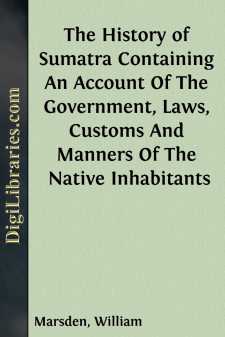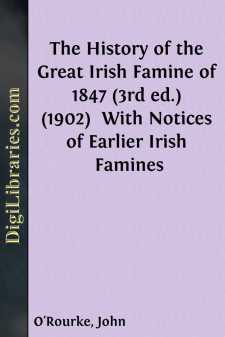History
- Africa 30
- Americas (North Central South West Indies) 50
- Ancient 68
- Asia 58
- Australia & New Zealand 8
- Canada 41
- Caribbean & West Indies 1
- Civilization 20
- Eastern Europe 12
- Europe 310
- Expeditions & Discoveries 60
- General 77
- Historical Geography 1
- Jewish 9
- Latin America 3
- Medieval 8
- Middle East 13
- Military 248
- Revolutionary 8
- Study & Teaching 5
- United States 353
- Western Europe 56
- World 13
History Books
Sort by:
by:
Titus Livius
BOOK XXVII. Cneius Fulvius, proconsul, defeated by Hannibal and slain; the consul, Claudius Marcellus, engages him with better success. Hannibal, raising his camp, retires; Marcellus pursues, and forces him to an engagement. They fight twice; in the first battle, Hannibal gains the advantage; in the second, Marcellus. Tarentum betrayed to Fabius Maximus, the consul. Scipio engages with Hasdrubal, the...
more...
by:
William Marsden
CHAPTER 1. SITUATION.NAME.GENERAL DESCRIPTION OF THE COUNTRY, ITS MOUNTAINS, LAKES, AND RIVERS.AIR AND METEORS.MONSOONS, AND LAND AND SEA-BREEZES.MINERALS AND FOSSILS.VOLCANOES.EARTHQUAKES.SURFS AND TIDES. If antiquity holds up to us some models, in different arts and sciences, which have been found inimitable, the moderns, on the other hand, have carried their inventions and improvements, in a variety...
more...
by:
John West
SECTION I [1643.] At the era of discovery by Tasman, Van Diemen's Land was inhabited. He heard, or thought he heard, the voices of people and the sound of a trumpet: he noticed the recently cut notches, five feet asunder, on the bark of the trees, and he saw the smoke of fires. He inferred that they possessed some unusual method of climbing, or that their stature was gigantic. In the sound, the...
more...
by:
John West
SECTION I Nearly fifty years have elapsed, since Van Diemen's Land was numbered with the colonies of the British empire. A generation has risen up and is passing away. Thousands, while they venerate the land of their European ancestors, with an amiable fondness love Tasmania as their native country. They will, hereafter, guide its affairs, extend its commerce, and defend its soil; and, not...
more...
INTRODUCTORY CHAPTER. At the present day, when our Continental neighbours are outvying each other in the completeness of their military organisations and the size of their armies, while in the United Kingdom complaints are daily heard that the supply of recruits for the British Army is not equal to the demand, it may not be out of place to draw the attention of the public to a source from which the...
more...
by:
John O'Rourke
The great Irish Famine, which reached its height in 1847, was, in many of its features, the most striking and most deplorable known to history. The deaths resulting from it, and the emigration which it caused, were so vast, that, at one time, it seemed as if America and the grave were about to absorb the whole population of this country between them. The cause of the calamity was almost as wonderful as...
more...
by:
Richard Crawley
CHAPTER I The State of Greece from the earliest Times to the Commencement of the Peloponnesian War Thucydides, an Athenian, wrote the history of the war between the Peloponnesians and the Athenians, beginning at the moment that it broke out, and believing that it would be a great war and more worthy of relation than any that had preceded it. This belief was not without its grounds. The preparations of...
more...
English writers have done more for the illustration of Spanish history, than for that of any other except their own. To say nothing of the recent general compendium, executed for the "Cabinet Cyclopaedia," a work of singular acuteness and information, we have particular narratives of the several reigns, in an unbroken series, from the emperor Charles the Fifth (the First of Spain) to Charles...
more...
CHAPTER I. THE BIRTH OF THE TELEPHONE In that somewhat distant year 1875, when the telegraph and the Atlantic cable were the most wonderful things in the world, a tall young professor of elocution was desperately busy in a noisy machine-shop that stood in one of the narrow streets of Boston, not far from Scollay Square. It was a very hot afternoon in June, but the young professor had forgotten the heat...
more...
by:
Julian Hawthorne
INTRODUCTION When we speak of History, we may mean either one of several things. A savage will make picture-marks on a stone or a bone or a bit of wood; they serve to recall to him and his companions certain events which appeared remarkable or important for one or another reason; there was an earthquake, or a battle, or a famine, or an invasion: the chronicler himself, or some fellow-tribesman of his,...
more...











